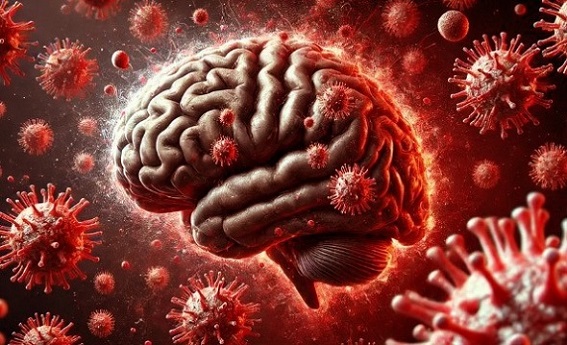SARS-CoV-2 Orf6 Protein Found to Kill Human Brain Cells by Damaging Mitochondria
Nikhil Prasad Fact checked by:Thailand Medical News Team Sep 09, 2025 4 months, 2 weeks, 3 days, 4 hours, 21 minutes ago
Medical News:
A new discovery on how COVID 19 damages the brain
Researchers from the National Brain Research Centre (India), CSIR-Institute of Genomics and Integrative Biology (India), University of Texas Medical Branch (USA), Jamia Millia Islamia (India), University of Houston (USA), and the Regional Centre for Biotechnology (India) have made an alarming discovery about how the coronavirus harms the brain. According to their work, a small viral protein called Orf6 directly attacks brain cells and causes them to die through a process known as necroptosis. This Medical News report shows that this viral protein disrupts mitochondria, the tiny powerhouses inside cells, and triggers inflammation and cell death.
 SARS-CoV-2 Orf6 Protein Found to Kill Human Brain Cells by Damaging Mitochondria
The hidden danger of Orf6 in brain cells
SARS-CoV-2 Orf6 Protein Found to Kill Human Brain Cells by Damaging Mitochondria
The hidden danger of Orf6 in brain cells
The scientists studied 22 different proteins of SARS-CoV-2 and found that Orf6 was the most toxic to human cells. Unlike other forms of cell death, which may be less harmful, Orf6 activated a destructive pathway involving RIPK3 and MLKL—markers of necroptosis. This was confirmed both in laboratory-grown human neurons and in brain samples taken from COVID-19 patients. The hippocampus, the brain region critical for memory and learning, showed clear signs of this type of cell death. This provides an explanation for the “brain fog,” memory issues, and cognitive problems reported in many long COVID patients.
Mitochondria under attack
The key discovery was that Orf6 binds to a protein in the mitochondrial membrane called MTCH1. This interaction caused a dangerous overload of calcium inside mitochondria, loss of their energy potential, and the release of harmful molecules called reactive oxygen species (ROS). All these changes led to serious mitochondrial dysfunction. When MTCH1 was blocked, or when the RIPK3 pathway was inhibited with a drug, the neurons were rescued from death. This highlights MTCH1 and necroptosis as potential new drug targets to prevent long-term neurological damage caused by COVID-19.
Why this matters for long COVID
The study suggests that long COVID symptoms such as brain fog, poor memory, headaches, and mood changes may not just be random aftereffects, but rather the direct result of this virus-driven mitochondrial dysfunction and necroptosis in neurons. Since the hippocampus was strongly affected, the findings directly connect the molecular damage seen in brain cells with the cognitive problems many survivors experience. The researchers stress that therapies aimed at blocking the Orf6-MTCH1 interaction or inhibiting necroptosis could be promising future strategies to protect the brain.
Final thoughts
This groundbreaking study provides one of the clearest explanations yet for how SARS-CoV-2 damages the brain. It moves beyond simple observation of symptoms and pinpoints a direct molecular pathway—Orf6 triggering MTCH1-related mitochondrial collapse and necroptosis. The fact that brain autopsy samples from COVID-19 patients confirmed these results strengthens the case that long COVID’s neurological problems stem from lastin
g cellular damage. While more research is needed, this work opens doors to new therapies that could protect millions from long-term brain issues after infection. It also highlights that COVID-19 is far more than a respiratory disease, with deep and lasting effects on the nervous system.
The study findings were published on a preprint server and are currently being peer reviewed.
https://www.researchsquare.com/article/rs-7291444/v1
For the latest COVID-19 News, keep on logging to
Thailand Medical News.
Read Also:
https://www.thailandmedical.news/news/sars-cov-2-proteins-found-to-damage-brain-cells-and-trigger-inflammation
https://www.thailandmedical.news/news/covid-19-is-damaging-nerve-cells-via-trpv1-activation
https://www.thailandmedical.news/news/scientists-from-maryland-discover-that-sars-cov-2-orf3a-protein-causes-brain-cell-death
